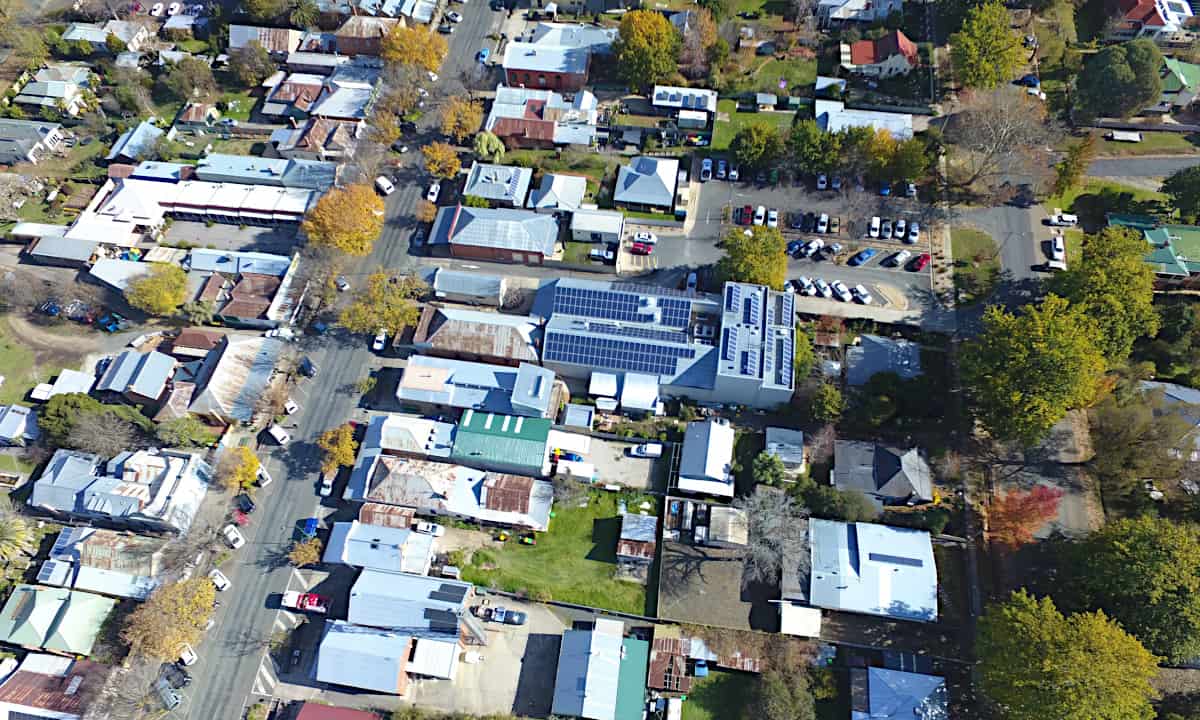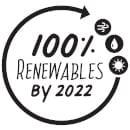Community-scale energy generation & storage
What does it take and what’s the best way of reaching 100% renewables – that’s what the 100% feasibility study is all about.
Delayed by Covid, this 21-month study and keystone project forms part of the final stage of TRY’s five-stage road map: to achieve our goal of 100% renewable energy for Yackandandah. We’re now hopeful of reaching our goal by 2024.
Totally Renewable Yackandandah (TRY) formed in 2014 and we have diligently strived to promote renewable energy and its benefits to the town, leading to a town-wide solar installation density nearing 60%. Yack residents have embraced the challenge and our combined efforts have resulted in three operating microgrids, multiple solar and heat pump hot water offers, a community virtual power plant, a 274 kWh community battery, an energy coaching service and the launch of community energy retailer, Indigo Power. Each of these is an important and necessary component on the path to 100% but doesn’t answer the question of what is the best way to get there.
In July 2020 TRY received a federal grant of $346,000 to investigate the feasibility of community-scale energy storage and generation for Yackandandah using microgrids: the 100% Feasibility Study.

The term community-scale means larger than household-scale and, for a small town like Yackandandah, smaller than typical commercial projects. And it’s a feasibility study because it’s identifying the best mix of technologies, financially, technically and socially, to complement the town’s existing and projected energy usage, and energy generation and storage capacity.
In other words, it’s tailor-made for Yack!
The technical study is now complete and a reader-friendly Outcomes Report shows what work was done and the main results. You can find the report here. Read on below to see what the project was about or watch this short video for a summary of the results.
Funding & goals
The funds are provided by the Department of Industry, Science, Energy and Resources via their Regional and Remote Communities Reliability Fund to assist grid-challenged communities in regional and remote areas develop more reliable, secure and cost effective energy solutions.

One of TRY’s aims as part of our 100% goal is to develop greater resilience for the town during weather extremes and natural disasters. The project aim is to develop a reliable, cost effective and resilient 100% renewable power supply which will bring multiple benefits to Yackandandah, while reducing carbon emissions. Part of that goal includes investigating islandability: the ability for the town to operate independent of the mains grid for a period of time, if the connection to the grid is disrupted. This will be invaluable during times of crisis, such as bushfires.
Also implicit in the project goals is that money saved on general energy costs, and reduced disruption during extremes, means the savings can be spent elsewhere in the community, and during disruptions the town can still operate. This is a powerful and regenerative outcome that speaks to the town’s identity and sense of agency.
Partners
In order to deliver such a significant project we’ve partnered with local firm, Mach2 Consulting, to manage the project and undertake the financial feasibility.
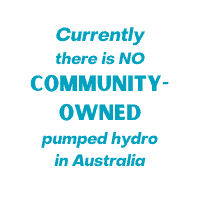
Given Yackandandah’s geographical location, pumped hydro and battery storage* are the main contenders for the critical and technically challenging energy storage component. So we’ve asked Tamar Hydro and Mondo (a subsidiary of AusNet Services) to analyse the technical feasibility of these options. Solar and wind generation, locally sourced if possible, are the main contenders for energy generation and will be assessed by Mach2.
The results from the technical analyses will be fed into a financial analysis which will identify the best mix of options, the best pathway to implement them and the best way of financing and operating them.
(* For an overview of the relevance of battery storage to small communities, check out this article.)
Affordable, reliable, resilient
Residents in rural and regional areas are very familiar with power supply fluctuations, as the delicate and aging system of electrical transmission lines across those areas is susceptible to disruption. Local sources of electricity generation and storage, and the innovative ways of managing them using microgrids, can provide more reliable power supplies at lower cost, without expensive network transmission upgrades.
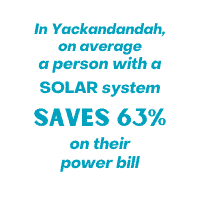
The economics of solar systems also mean that the power they provide is cheaper in the long term. In Yackandandah, on average a person with a solar system saves 63% on their power bill. The majority of systems pay for themselves within 3-5 years, and thereafter the savings from cheaper electricity can be used for other purposes.
In a country which is experiencing more extreme weather, and the flow on effects such as bushfires, resilience is in high demand. The ability to keep operating independently despite disruptions to the main power grid, or islandability, is a valuable commodity. The degree of islandability might include only essential services, such as the CFA, health service and relief centre, or it may include the town business centre, and it can extend for hours or a couple of days.
Community participation
While TRY is a small band of volunteers, community consultation and collaboration have always been integral to what we do. We spent the first 18 months after we formed talking to people before starting any projects, and it was the community that convinced TRY the 100% goal was desirable.
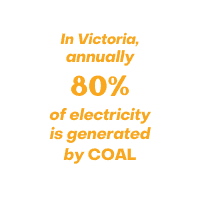
We chat regularly with Yack locals to ask them what they think. For this project we held a town hall meeting and some drop-in sessions in December 2020, with follow-up events delayed by the Covid-19 pandemic and eventually held in September 2021 and April 2022. We also get many requests from communities around the country who are interested in what we’re doing and our volunteer committee give our time wherever we can.
Stay in touch
If you’d like to keep up to date with our latest ventures, follow the TRY Facebook page, look at the news feed on this website, or subscribe to the TRY mailing list. As a subscriber you’ll get a quarterly newsletter and the occasional email about upcoming events. And if you’d like to demonstrate your support, you can also also become a member of TRY or Donate!
